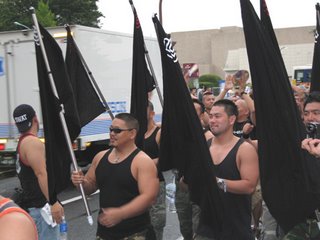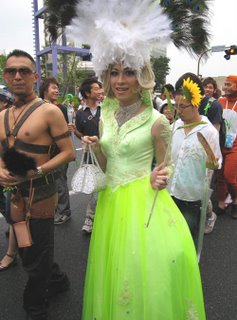Omae Kenichi1.It is obvious that Hirohito emperor,who holded the supreme command under Meiji constitution, is responsible for the war.
2.He was given a new role for the advantage of the occupation.without being holded the responsibility.
3.It is understood that all the responsibility lies in A criminals.
4.The emperor visited Yasukuni for a while after the war.
5.He quited visiting after A criminals was enshrined.
6 Japan-China friendship was built on the understanding that A criminals were responsible for the war and both nationals were victims.
7. China insists that we must start asking all over again the question as to who should be held responsible for the war,if Japanese prime minister visits Yaskuni,which enshrine A criminals,
8.Koizumi insists that an individual be free to pray for the war-dead,and that a foreign nations should not interfere with a domestic matter.
9.Many Japanese are content with the second role of the emperor,and appreciate and respect him.He died in 1989.
10.Tomita memo and memorial record in 90's make it clear that he assumed the only second role.
Given this background, it is clear that three hidden agenda make the issue hard to understand.
1.The emperor forgets the fact that he was pardoned for political purpose and he tried to distance himself from A-criminals,pretended that he himself was a victim.
2.Then Tanaka faction and then Chinese administrators interpreted the postwar arbitrarily without making its presuposition known to the nationals and they abused the interest and right of ODA and so on.
3.While Koizumi was busy attacking Tanaka faction,stepping on a detonator of the interest and right....he got in the dilemma(visiting Yasukuni,not visiting Yasukuni is no good.
Conclusion:
Chidoriagafuchi is only for war deads. It is not planned to include A criminals.
Public officers should go to Chidorigafuchi,and should not visit Yasukuni.
Yasukuni shrine, do whatever you want.
I am not inclined to blame only A criminals. We can create a new nation,and we can progress only if Japanese nationals and the emperor equally take responsibility.
1.明治憲法下で統帥権をもつ昭和天皇の戦争責任は明白である
2.戦後その責任が問われることはなく、占領統治に有利な新しい役割が与えられた
3.戦争の全責任は占領下の東京裁判においてA級認定された者に帰属する、とされた
4.戦後しばらくは天皇も政治家も靖国に参拝していた
5.1978年にA級戦犯が合祀されてからは天皇は靖国参拝をやめた
6.A級戦犯に大戦の責任を取らせ、両国民は犠牲者、という理解で日中友好が推進された
7.A級戦犯を合祀する靖国に首相が参拝するなら戦争の責任議論をぶり返す、と中国
8.戦争犠牲者の冥福を祈るのは自由だ、外国の干渉は受けない、が小泉首相の言い分
9.多くの国民は裕仁天皇の第二番目の役割に満足、感謝、尊敬。そして1989年崩御
10.富田メモ、および90年の回顧録で、裕仁天皇は自分でも二番目の役割のみ認識
このような経緯を見ると三つの大きな“隠されたアジェンダ”が本件を分かりにくくしていることが明白になる。
1.昭和天皇が東京裁判で免訴されたことを忘れ、いつの間にか自分も戦争の犠牲者だ、と考えA級戦犯から距離を置こうとしたこと
2.田中派と中国の為政者たちが戦後処理に関して自分たちに都合のよい解釈をし、A級戦犯に全責任を押し付けてODAなどの利権をほしいままにしたが、国民にはその前提を開示していない
3.田中派利権つぶしに奔走した小泉首相が道路、郵政、中国、などの利権の雷管を踏みまくっている間に靖国問題でやぶへびとなり、予想外のジレンマに陥った(行っても騒動、行かなくても騒動)
神社側の理屈を取るなら裕仁天皇もまた合祀の対象にしなくてはいけないのではないか、という疑問である。少なくとも東京裁判を否定し、また天皇の免訴という駐留軍のご都合主義を否定するなら、そういうことになろう。しかし、いまのわたしにはそれを提案する気はない。唯一の救いは千鳥ケ淵が「戦没者慰霊碑」とのみなっており、少なくとも合祀議論の対象者(A級戦犯および昭和天皇)は含まれていない。だから、(1)公人は千鳥ケ淵にのみ参拝、(2)靖国は国民の統合の象徴(天皇)、および選ばれた代表(首相など)は参拝しない、(3)靖国神社は自分たちの好きなようにすればよい、ということになる。
わたしにはA級戦犯といわれている人々だけにあの悲惨な戦争の責任を押し付ける気はまったくない。国民、天皇、等しく責任を感じてこそ新たな国が生まれ、進歩があると思うからである.nikkei

 Japanese nationalism???
Japanese nationalism???